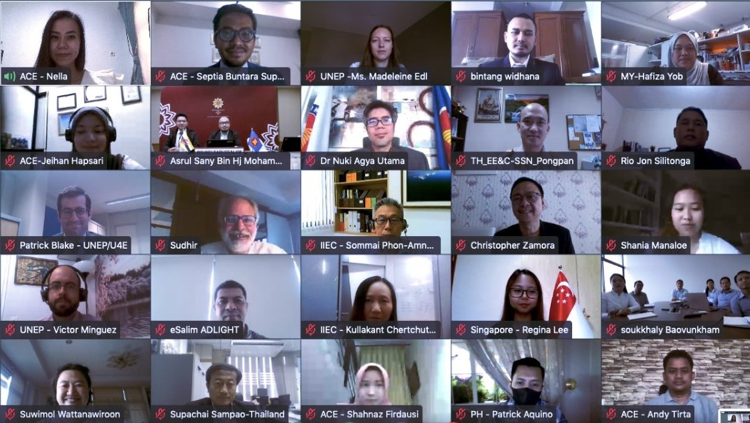Menu
Online, 5 April 2021Supporting Energy Efficiency and Conservation (EE&C) Programme Area of ASEAN Plan of Action for Energy Cooperation (APAEC), ASEAN Centre for Energy (ACE) has been collaborating with United Nations Environment Programme – United for Efficiency (UNEP- U4E) for more than a decade to coordinate the global activities with the regional initiatives. One of the implementations of ACE-UNEP U4E partnership is a virtual workshop titled “Realising the Shift of ASEAN’s Markets to Energy-Efficient and Climate Friendly Appliances”on 5 April 2021.

The event, which was part of the 25th EE&C Sub-sector Network (SSN) and Associated Meetings, was opened by welcome remarks from Mr. Abdul Salam bin Hj. Abdul Wahab, Head of Sustainable Energy Division, Ministry of Energy, Brunei Darussalam.
The first session was moderated by Mr. Septia Buntara of ACE, featuring Mr. Rio Jon Piter Silitonga (ACE), Mr. Patrick Blake, Ms. Madeleine Edl, and Mr. Victor Minguez (UNEP U4E); and Mr. Sommai Phon-Amnuaisuk (IIEC) as speakers.
One of the basic directions of Energy Efficiency (EE) under APAEC Phase II is to achieve 32% primary energy intensity reduction in 2025. Mr. Rio Jon Piter Silitonga explained that based on APAEC Targets Scenario (APS) trendline, ASEAN will exceed the achievement: 32.5% by 2025. Other directions are expansion on standard harmonisation for more appliances and industry equipment; and improve the ASEAN energy efficiency database system. To follow these directions, ASEAN Product Registration System (PRS), a collaboration between ACE and UNEP to support the harmonization of EE standards in the region, was formed.
The benefits of PRS were broadly described by Mr. Patrick Blake, which are: creates a database with product information, monitors which products are sold in market, places information on environmental impact of the products at the fingertips of government, fosters economic development, and encourages consumers to choose energy-efficient products. Ms. Madeleine Edl further explained about data exchange In Southeast Asia from the registered products in existing national PRS to the transferred data via Application Programming Interface (API) and the regional system collects the information from the national level in a common database (access is limited to the national regulators from 10 ASEAN countries). The advantages of installing an API are Automation, Efficiency, Reliability, Unity mentioned by Mr. Victor Minguez.
Mr. Septia Buntara wrapped up the session with panel discussion onthe importance of sharing the data on a regional level with feedbacks and perspectives from ASEAN Member States (AMS). The panellists are Ms. Hafiza Yob, Ms. Naing Lynn, Mr. Chwa Hock Chuan and Mr. Le Ba Viet Bach, sharing the status in their respective countries.
Malaysia already has product registration database such as certifications for 199 categories of electrical equipment. PRS would be very useful for Myanmar since they have not got that kind of registration system. Same as Malaysia, Singapore has national product registration and they have published selected energy performance information that is available to the public. Vietnam already have data system but still need further data preparation and study, also workshop and discussion.
The second session was moderated by Dr Zulfikar Yurnaidi of ACE. Mr. Bintang Widhana (ACE), Mr. David Wellington and Mr. Patrick Blake (UNEP U4E) were invited as speakers.
The purpose of National Lighting Roadmaps is to provide clear guidelines in adoption of policies to promote the use of efficient lighting product and to achieve the regional harmonisation targets by 2023 in ASEAN. The regional lighting roadmap work based on harmonization, testing infrastructure and mutual recognition agreements (MRA).
The implementation of the regional roadmap has been started from September 2019 until present, March 2021. The roadmaps of ASEAN countries are available in three different status, approved, drafted, and finalised version. Thailand is approved by DEDE, Indonesia is in the third version where it is currently being drafted, Singapore has already sent the third version with the rest of the countries has been sent its roadmap in first and second version.
Moreover, U4E developed the guidelines of model regulation to informing the regulators, authorities, and policy makers in developing as well as setting a minimum efficiency floor to prohibit future sales of inefficient products in the market. The assessment of energy savings (cooling, lighting, equipment, industrial motors) aim to provide an evidence base to promote energy efficient product on cooling, lighting, and equipment.
The workshop is wrapped up with panel discussion on energy efficient lighting and appliances in the ASEAN Region – AEO6 Findings. We need to know how the countries condition based on the data and then try to create official statistics, but the engagement is still limited. This panel closed with reviews on data gathering challenge, how to improve it, and encouraged closer collaboration with other countries to get more details on the data.
(SNF)
By Shahnaz Nur Firdausi
